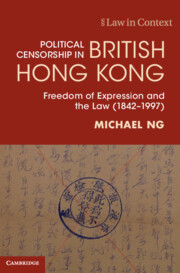Book contents
- Political Censorship in British Hong Kong
- Law in Context
- Political Censorship in British Hong Kong
- Copyright page
- Contents
- Figures
- Tables
- Acknowledgements
- Abbreviations
- Introduction
- 1 Punitive Censorship and Libel Lawsuits against the Press
- 2 ‘Reading Every Line’: Era of the Daily Vetting of Newspaper Proofs
- 3 ‘Communist China Now Contiguous to Hong Kong’: Censorship Imposed by the ‘Free World’
- 4 ‘Patriotism to You Can Be Revolutionary Heresy to Us’: Hardened Control of Media, Schools and Entertainment
- 5 Preparing to Negotiate with China: Overt Loosening and Covert Control
- 6 Liberating Hong Kong for China: De-silencing the City
- Conclusion and Epilogue
- Glossary of Chinese Newspapers
- Bibliography
- Index
6 - Liberating Hong Kong for China: De-silencing the City
Published online by Cambridge University Press: 21 July 2022
- Political Censorship in British Hong Kong
- Law in Context
- Political Censorship in British Hong Kong
- Copyright page
- Contents
- Figures
- Tables
- Acknowledgements
- Abbreviations
- Introduction
- 1 Punitive Censorship and Libel Lawsuits against the Press
- 2 ‘Reading Every Line’: Era of the Daily Vetting of Newspaper Proofs
- 3 ‘Communist China Now Contiguous to Hong Kong’: Censorship Imposed by the ‘Free World’
- 4 ‘Patriotism to You Can Be Revolutionary Heresy to Us’: Hardened Control of Media, Schools and Entertainment
- 5 Preparing to Negotiate with China: Overt Loosening and Covert Control
- 6 Liberating Hong Kong for China: De-silencing the City
- Conclusion and Epilogue
- Glossary of Chinese Newspapers
- Bibliography
- Index
Summary
Chapter 6 traces the trajectory of a renewed consciousness of the rule of law and various freedoms in the final decade of colonial rule and unpacks the geopolitical concerns and motivations of the British government in de-silencing Hong Kong before the handover in 1997. The conclusion in 1984 of negotiations between Britain and China on the reversion of Hong Kong’s sovereignty to the latter marked the opening of an era of liberalistic rule of law and individual freedoms in Hong Kong. Laws and regulations that had been used to suppress free speech, control publication and prosecute political protesters were loosened or repealed one after another in the late 1980s and early 1990s. Hong Kong’s first statute expressly recognising freedom of speech, assembly and association was passed only in 1991, just six years before the colonial era came to an end. Not only were laws and senior judicial appointments liberalised in the last decade of British rule, but the 1980s and 1990s also witnessed unprecedented levels of public discussion of, and official and media narratives on, the importance of free speech and the rule of law to Hong Kong.
Keywords
- Type
- Chapter
- Information
- Political Censorship in British Hong KongFreedom of Expression and the Law (1842–1997), pp. 164 - 189Publisher: Cambridge University PressPrint publication year: 2022

